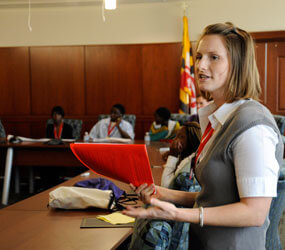An international delegation of more than 20 young people “infected or affected” by HIV met at the University of Maryland School of Medicine in Baltimore Sept. 16 to exchange ideas on preventing and managing HIV in young people throughout the world.
The delegation included three representatives from Africa who receive help from the Orphans and Vulnerable Children Program, which is administered by Baltimore-based Catholic Relief Services. Other participants hailed from major cities in the United States, including Baltimore.
During an open discussion in front of 20 national medical and policy-making leaders, many of the youths said it is important for HIV-infected teens to receive more support as they make the transition from pediatric care to adult care. Teens need more help from social workers in understanding their care options and how they can be accessed, they said.
“I had a mother and grandmother to back me up,” said a young HIV-infected woman from Baltimore who was born with the virus. “Some don’t have the support system at home. They don’t know what it is to make an appointment with a doctor or how to pick up a prescription at a pharmacy.”
A young woman from Tampa said people of her generation are looking for doctors who will treat them with dignity and not merely another case.
“We want to have a relationship not only on a medical level,” she said, “but on a personal level too.”
An HIV-positive young man from Washington D.C. added that he had to look at eight different clinics before he finally found one that met his needs once he became an adult.
“I was looking for a place where I could just be normal and not be stigmatized,” he said. “I wanted a doctor who wanted to be there for me.”
Several participants said many people still have unfounded fears that they might get infected with the virus through casual contact A young woman from Uganda noted that caregivers especially need education on the disease.
“Not everyone wants to live with an HIV-infected person,” she said.
Among their recommendations, the young people suggested that a peer-to-peer program be started so that HIV-infected young people can act as mentors or counselors. They also advocated the establishment of a website managed by young people where teens can go for referrals, advice and support.
Dr. Ligia Peralta, associate professor of pediatrics at the University of Maryland School of Medicine, said the recommendations will be compiled in a report that will be sent to agencies in the United States and around the world. She would also like to see it presented at the International AIDS meeting in 2012. Millions of people will have access to the document, she said.
“This platform is very unique because it’s the first time their voices are the ones leading the change,” she said.
Dr. Mychell Farmer, HIV technical advisor with CRS, said the forum provided a good exchange of ideas. She hopes the dialogue is ongoing.
“I’m really hoping some of them will make good on the promise to continue their education and build their capacity as support providers and experts in supportive activities,” she said.
The leadership summit was sponsored by the University of Maryland School of Medicine in collaboration with CRS.


